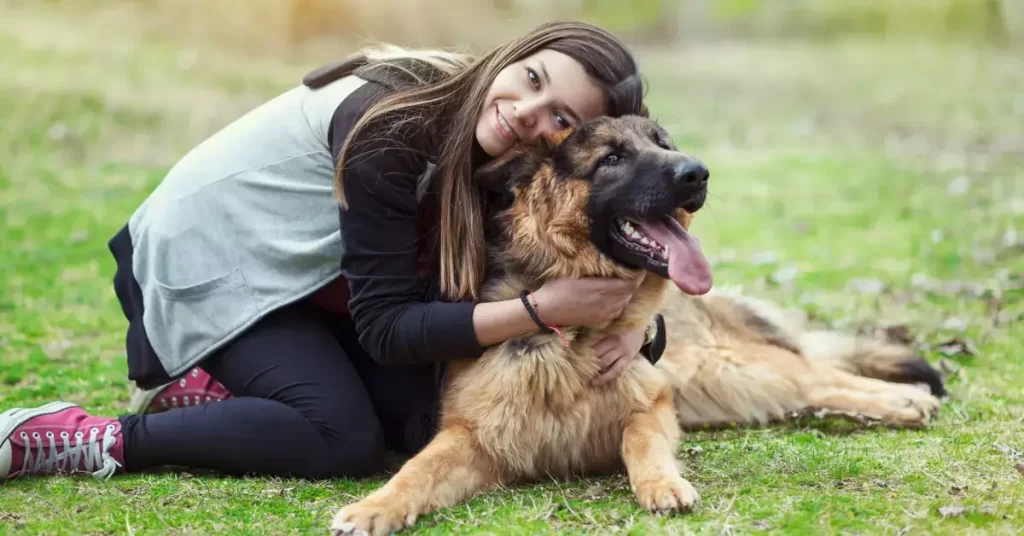How Long Do German Shepherds Live? – Tips To Increase Lifespan

German Shepherds are a very popular breed of dog and they can be found in many homes around the world. German Shepherds require a lot of exercises, and lots of time grooming for their double coat to maintain their beautiful appearance.
German Shepherds will not be able to enjoy themselves if they become obese as this can cause health problems. German Shepard food should also be monitored as overfeeding them can lead to obesity too!
German Shepherds make great pets because they provide endless love, but it is really important that you take care of them correctly otherwise they may not live as long as other breeds.
German Shepherds are definitely a breed that requires a lot of time and energy, but they are adored by humans and can be great pets if cared for correctly.
This article will provide you with information about what factors affect your German Shepherd’s life expectancy as well as tips for keeping them happy and healthy throughout each stage of their lives!
How Long Do German Shepherds Live?

Most German Shepherds will live for around 10 to 12 years. However, some German Shepherds may live for up to 14 or 15 years with the right love and care.
Make sure you always provide German Shepherds with enough exercise and access to freshwater, as well as groom them regularly.
There are a few health issues that are common in German Shepherds, such as hip dysplasia, elbow dysplasia, and bloat.
It is important to monitor your German Shepherd’s health and take him or her to the vet for regular checkups.
If you are able to keep your German Shepherd healthy and happy, he or she may live a longer life.
German Shepherds are a great breed of dog and make wonderful companions. German Shepherds are known to love their owners unconditionally and provide them with hours of companionship.
They are perfect for those who have plenty of time to spend with their pet and can provide them with all the exercise they need. If you are looking for a loyal, loving pet, German Shepherds may be the right breed for you!
What Are The Most Common Health Issues In German Shepherd?

German shepherds are one of the most popular dog breeds in the world. They are known for their intelligence, strength, and loyalty. However, like all breeds of dogs, German shepherds are susceptible to a number of health issues.
The most common health problems seen in German shepherds include hip dysplasia, elbow dysplasia, von Willebrand’s disease, and bloat.
Hip dysplasia is a condition in which the hip joint does not develop properly, leading to pain and lameness.
Elbow dysplasia is a condition in which the elbow joint does not develop properly, leading to pain and lameness.
Von Willebrand’s disease is a disorder that affects the blood’s ability to clot properly.
Bloat is a condition in which the stomach becomes overly inflated with gas or air due to swallowed air, fluid, or food and may twist, cutting off the return of blood from organs in the abdomen.
German shepherds are also prone to epilepsy, skin allergies, and a constantly wagging tail due to a congenital neurological disorder called “Happy Tail”.
In addition, German shepherds are one of the breeds of dogs most susceptible to hip dysplasia. In some breeds, hip dysplasia can be seen as early as four months old.
However, in German shepherds, it is more common for hip dysplasia to be seen as the dog reaches middle age between two and three years old.
The symptoms of hip dysplasia typically begin with a reluctance to climb stairs or jump into the car, followed by an obvious limp that comes and goes until finally, the dog is unable to use its rear legs.
The first signs of hip dysplasia are often very subtle and easy to miss. If you are the owner of a German shepherd, there are a few things you can do to help keep your dog healthy and reduce the risk of hip dysplasia.
First, make sure your dog is on good quality food that has been specifically designed for large breed dogs. Second, make sure your dog gets plenty of exercises. And finally, keep an eye on your dog’s weight and do not let it get too heavy.
Increase Lifespan Of Your German Shepherd:

When it comes to taking care of a German shepherd, there are a few key things to keep in mind to increase the lifespan of your lovable german shepherd.
One of the most important is diet. A healthy diet is key to keeping your dog healthy and happy.
Make sure to provide your dog with plenty of high-quality protein, fruits and vegetables, and omega-3 fatty acids. As for how much food, your German shepherd should eat around 25-35 calories per pound of their body weight.
Another important part of taking care of your German shepherd is ensuring that they get plenty of exercises. A healthy dog is a happy dog, and Exercise is key to keeping your shepherd healthy and fit.
Make sure to take your dog on long walks or hikes, play fetch or Frisbee with him, and let him run around in the park or backyard.
Finally, regular vet checkups are a must and keep your German shepherd up-to-date with their vaccinations. This will ensure that he does not get many of the fatal diseases out there, such as distemper, parvo, and rabies.
Additionally, be on the lookout for any signs of health problems and address them as soon as possible.
By following these simple tips, you can help increase the lifespan of your German shepherd and have him living a long, healthy life.
Final Thoughts:
German Shepherds are one of the most popular dog breeds around. It is often hard for people to find out how long their German Shepherd will live because there isn’t one set lifespan that applies to all dogs.
Dogs have different genes, so some may live longer than others depending on health conditions, genetics, or other factors.
Generally speaking though, most healthy German Shepherds can expect to live between 10-12 years old which is an average lifespan when compared with other breeds of dog.

